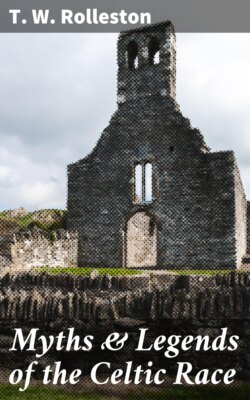Myths & Legends of the Celtic Race

Реклама. ООО «ЛитРес», ИНН: 7719571260.
Оглавление
T. W. Rolleston. Myths & Legends of the Celtic Race
Myths & Legends of the Celtic Race
Table of Contents
PREFACE
Illustrations
CHAPTER I: THE CELTS IN ANCIENT HISTORY
CHAPTER II: THE RELIGION OF THE CELTS
CHAPTER III: THE IRISH INVASION MYTHS
CHAPTER IV: THE EARLY MILESIAN KINGS
CHAPTER V: TALES OF THE ULTONIAN CYCLE
CHAPTER VI: TALES OF THE OSSIANIC CYCLE
CHAPTER VII: THE VOYAGE OF MAELDŪN
CHAPTER VIII: MYTHS AND TALES OF THE CYMRY
GLOSSARY AND INDEX
Отрывок из книги
T. W. Rolleston
Published by Good Press, 2020
.....
A characteristic scene from the battle of Clastidium (222 B.C.) is recorded by Polybius. The Gæsati,23 he tells us, who were in the forefront of the Celtic army, stripped naked for the fight, and the sight of these warriors, with their great stature and their fair skins, on which glittered the collars and bracelets of gold so loved as an adornment by all the Celts, filled the Roman legionaries with awe. Yet when the day was over those golden ornaments went in cartloads to deck the Capitol of Rome; and the final comment of Polybius on the character of the Celts is that they, “I say not usually, but always, in everything they attempt, are driven headlong by their passions, and never submit to the laws of reason.” As might be expected, the chastity for which the Germans were noted was never, until recent times, a Celtic characteristic.
Diodorus Siculus, a contemporary of Julius Cæsar and Augustus, who had travelled in Gaul, confirms in the main the accounts of Cæsar and Strabo, but adds some [pg 42] interesting details. He notes in particular the Gallic love of gold. Even cuirasses were made of it. This is also a very notable trait in Celtic Ireland, where an astonishing number of prehistoric gold relics have been found, while many more, now lost, are known to have existed. The temples and sacred places, say Posidonius and Diodorus, were full of unguarded offerings of gold, which no one ever touched. He mentions the great reverence paid to the bards, and, like Cato, notices something peculiar about the kind of speech which the educated Gauls cultivated: “they are not a talkative people, and are fond of expressing themselves in enigmas, so that the hearer has to divine the most part of what they would say.” This exactly answers to the literary language of ancient Ireland, which is curt and allusive to a degree. The Druid was regarded as the prescribed intermediary between God and man—no one could perform a religious act without his assistance.
.....